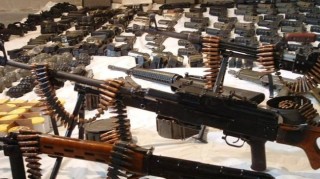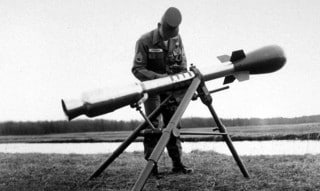
by Seth Ferris, … with New Eastern Outlook, Moscow

[ Editor’s note: Seth Ferris hits a grand slam home run with the piece below, on how the dynamics of modern warfare still follow the “use it or lose it” mentality and subterfuge of the past; and the general public has been slow to catch on, despite the long track record.
Part of that has been due to the professional army where young people are not drafted as cannon fodder, which ended with Vietnam. The unhappy “clued in” warrior that came home turned the war machine upside-down and turned a powerhouse president out of office.
The military complex people made a decision to eliminate that kind of blowback in the future with a professional army, deemed to be a mercenary one in terms of being used to defend certain financial interests.
This was confirmed by an unofficial survey of the 50% bailout of West Point officers, after the most recent Afghanistan and Iraq wars, when their obligatory five years were up. Some of the parents who had gotten to know each other started comparing notes as to why so many were leaving, when the chance to move up the ladder with combat experience had never been better.
Parents were relieved to learn that their own child (I knew someone who had three leave) was not the only one to leave because they had not signed on to be a mercenary for corporate financial and business interests.
The parents were disappointed at first, but then proud of their kids, including the women. The drug business cranking up so fast in Afghanistan and the total failure of the post-Saddam preparation were two of the most mentioned highlights.

One story I will add to Seth’s Libya material below that is not supposed to be told, but has been, and then was forgotten, is that of Gaddafi being a protégé of sorts of former CIA director Richard Helms.
Gaddafi had allowed Libya to be used as a Gladio base for several hundred terrorists, to move in and out of Europe to do some of the well-known mayhem attributed to communist groups to help them lose elections and keep anti-communist tensions at a “useful” level.
Not much has changed since then, except that the terrorists are not just small groups, but are now operating in military formations with open NATO-country support along with that of non-democratic authoritarian states, who became good partners in the proxy terror game.
The culmination of all this has been to see in the post financial collapse period, where bubble gum and bailing wire have been holding things together, the slow steady footsteps to pre-staging major international conflict via the series of terror wars and color revolutions that are targeting regions that had not evidenced any military threat to the rest of the world. Seth can take it from here, and this is a hell of a good read, folks. Bookmark this classic, and save it to read in parts… Jim W. Dean ]
___________

Once Libya, Now Take Your Pick: R2P Equals Right-2 Profit
– First published … April 24, 2016 –

Because ultimately, despite the accusations of the likes of former Ambassador Craig Murray, wars in faraway countries are not about resources.
They are about domestic defence procurement – what it is, what it isn’t, and what the politicians don’t want you to know about it.
__________
Laundering death

UNSC Resolution 1973 ostensibly gave legal justification for the international community to use appropriate force to protect civilians.
Specifically, it stated that in response to “urgent pleas from the Arab League and Libya’s citizens, the UN Security Council has approved a significant resolution … to address the outrageous violence being perpetrated by Colonel Gaddafi on the Libyan people.” (UNSC Resolution 1973, United States Mission to the United Nations, 2011).
So it’s still going on: we’ve had Syria, Iraq, Sudan, Ukraine, the Central African Republic and Yemen in recent times, and now Karabakh in Azerbaijan has joined the list of conflicts the great powers want to intervene in, but don’t actually want to do anything about.
It is well remembered that the French were ordered by their allies to show resistance when Hitler invaded. They did not, because it would have been pointless. There was no excuse for the degree of the later collaboration, but France couldn’t conjure up tanks and a credible army out of thin air. Resolutions aren’t necessarily capable of being implemented, however strongly worded they may be.
But nowadays, even countries struggling with enormous structural debt and mounting social problems can always find whatever they need to go to war. This is because political decisions are made to keep military forces and equipment available, even in peacetime.
When there is no local conflict threatening them, the Western powers in particular go to faraway places to use the training and equipment they have, otherwise too many questions would be asked about the sums spent on armaments in countries which aren’t officially at war with anybody.

This is how the UN knew that if it made a resolution concerning Libya, long a Western pariah, it would be acted upon. Not simply because the personnel and weapons are there, but because they have a shelf life.
Most soldiers are no longer useful when they reach middle age, and their weapons have an ever-more limited shelf life as technology continues to develop at breakneck speed. So somehow these resources have to be put to use, or there won’t be any justification for asking for more.
There is a reason the First World War is called The Great War, even though it was a lot shorter than many others. Traditionally, it was given that name because it changed the face of warfare by being the first mechanised conflict on a European scale. But its carnage also changed the concept of war itself.
Previously war was about glory, adventure and plunder. These needed to be offered to populations in times of poverty and crisis. After 1918 it was about loss of personnel and resources. You still fought wars to win, but the sacrifice involved was the focus.
It was not without reason that the belligerents of the Second World War were countries either struggling with depression and mass unemployment or trying to show they had got over such things by expressing military and national might.
If you had a problem, the answer was war. Regrettably it still is, provided it is someone else’s war, on someone else’s doorstep, so your own civilians don’t have to live through it.
If you want to solve your welfare problems and get rid of your resources, starting or intervening in wars is very convenient. If you don’t use those resources you won’t get the funding for any more. If you don’t buy more you will alienate the arms lobby.
__________
Breaking news to nobody
The wording of UN Security Council Resolution 1973 is revealing. A phrase such as “the outrageous violence being perpetrated by Colonel Gaddafi on the Libyan people” was only to be expected in what was effectively a Western bloc document. But that is exactly what is wrong with it.
Gaddafi got away with conducting a coup against Western interests back in 1969. He then proceeded to take every step which might antagonise the West – declaring sharia law, making Libya a socialist state, allegedly sponsoring the wrong type of terrorists. Throughout this period, he was also accused of perpetrating violence against his people, with repression of opponents commonplace.
None of this resulted in any UN resolution to “protect” Libya. On the contrary, the same US which was most vocally anti-Gaddafi did a great deal to enable his alleged crimes. A leaked U.S. diplomatic cable shows that Senator John McCain (who else?) promised to help Libya obtain U.S. military hardware in a discussion with Gaddafi held as recently as 2009.
Along with Senator Lindsey Graham, he conveyed the U.S. interest in continuing the progress of the bilateral relationship and pledged to try to resolve various issues with Congress and Defense Secretary Gates, to which Gaddafi said nothing.
__________
Libya’s counterterrorism cooperation

The two Senators even expressed appreciation for Libya’s counterterrorism cooperation in the region, when their country had long branded Gaddafi himself as a terrorist.
This is why he was still referred to as “Colonel” in UNSC Resolution 1973, rather than by any of the other titles he had allotted himself.
Continued use of that title was meant to convey the idea that Gaddafi had seized power in a coup and was therefore invalid, adding to the charges against him, as such a ruler could be capable of anything.
Then all of a sudden, the violence Gaddafi had always allegedly been perpetrating, and in some cases was, was declared to be a matter requiring UN intervention.
It is true that just prior to the resolution, his army had killed hundreds of protesters, who were inspired by the Western-fomented Arab Spring and had possibly been gathered simply to be shot at. But this in itself was not considered exceptional, as reports of such behaviour had fueled the West’s view of Gaddafi for the previous forty years.
The difference now was that Libya had to be dragged into the Arab Spring revolts to justify those. It was the symbol of all that was allegedly wrong with the Arab world, Gaddafi being a great admirer, and self-declared political heir, of the West’s previous regional bogeyman, Gamal Abdel Nasser of Egypt.
Those revolts would have made no sense if the country which should logically have had them first, Libya, had remained untouched and Gaddafi remained in power. Why was the Arab Spring necessary in all these other countries?

The West had a position on them all, even though few people took much notice. This could be expressed in the following terms: we are in favour of democracy and human rights, and against fundamentalism, but do not wish to define what any of these terms actually mean, so that we can use them to our advantage whenever we like.
Anything which took place in these countries, even if perpetrated by a Western-sponsored regime which had been trained to do it, as in Yemen, could be used to justify an intervention on the grounds that it contradicted Western principles.
A whole string of uprisings in related countries makes more sense than a few isolated ones in unrelated countries, providing a stronger case for intervention, provided the ultimate enemy is one previously identified, whose image can be imprinted on the others.
After Ben Ali in Tunisia and Hosni Mubarak in Egypt, it was Muammar Gaddafi’s turn to violently leave the stage, covered in blood; he may not be the last to suffer a similar fate (Rousseau, 2011).
Both the Tunisian and Egyptian presidents thought they were protected, largely by not being Gaddafi, and thus useful counterweights to him. But they failed to understand the arms procurement mechanism protects no one, and that everyone and everything is expendable, if it means keeping that mechanism going.
_________
War on rust

The weapons used in Libya, and the interventions in the other Arab Spring revolts, were not state-of-the-art equipment. They were old stuff which had to be used to get the funding for more.
Either they were used up destroying the country, or they had to be considered lost so that better quality weapons could be sold on to terrorists – who strangely emerged at the same time as these interventions, in every Arab Spring country.
We know this because the intervention was not described as an offensive, or a defence of the homeland. It was invoked under the pretext of “Responsibility to Protect (R2P)” – a core NATO principle, but one which, as we have seen, is completely ignored time and again when civilian populations demand help, and Western allies like Cyprus are invaded.
In practice this doctrine means: “If we invoke it, we will do just enough, no more, and get out as soon as we can because we are only there to protect.” The various “peacekeeping” forces sent round world under the same doctrine have consistently complained about the quality of the equipment given them.
Protecting others invariably means dumping your junk on them, often in terms of manpower as well as equipment. Open offensives, such as the Gulf War, are where the best equipment are used, which is why we are given much more detail about that equipment, what it’s called, who made it, how much it cost.

“Louise Hamilton,” a London-based business consultant, was sent to Libya to do a contract in the oil industry just before the NATO planes came. She tried to get out as soon as the conflict came to her hotel. At this point she phoned Seth Ferris, and described how she was soon finding out who her friends were.
The company that had sent her had given her up for dead, and even the Red Cross didn’t want to know – it was people not involved with politics, thousands of miles away, who eventually procured her repatriation. When conflict breaks out in most countries, embassies and aid agencies do everything they can to get foreign nationals out.
When NATO entered Libya claiming a “Responsibility to Protect,” no one wanted to protect her, even though every NATO country’s embassy should have been even more geared to offering that protection.
Ramesh Thakur of the Australian National University said when the Libyan intervention began in 2011:
“The evolution of R2P and prospects of its being authorized/used again; this would depend on how Libya turns out. If NATO respects its limitations and success is achieved, R2P stands vindicated. If (resolution) 1973 (on Libya) is abused and a messy stalemate ensues, the bar will be greatly raised.”
The bar was not raised as a result of the bloody failure of the R2P intervention in Libya because it was never intended to protect, and NATO always knew it. It was designed to bring Libya into the Arab Spring, itself a means of using up or selling off weapons so the military-industrial complex could keep itself rolling at the same levels.
All the interventions we are seeing today have the same cause.
When the film “Silkwood” was released in 1983, and suggested that Karen Silkwood was murdered by the nuclear industry to prevent her talking about what it had done to her, there was an outcry.
What will it take for there to be a similar outcry about people being sent to their deaths and murdered, and whole countries destroyed, just so a few arms dealers and agents can keep getting those enormous defence contracts?
Seth Ferris, investigative journalist and political scientist, expert on Middle Eastern affairs, exclusively for the online magazine “New Eastern Outlook”.
______________

Jim W. Dean is VT Editor Emeritus. He was an active editor on VT from 2010-2022. He was involved in operations, development, and writing, plus an active schedule of TV and radio interviews. He now writes and posts periodically for VT.
ATTENTION READERS
We See The World From All Sides and Want YOU To Be Fully InformedIn fact, intentional disinformation is a disgraceful scourge in media today. So to assuage any possible errant incorrect information posted herein, we strongly encourage you to seek corroboration from other non-VT sources before forming an educated opinion.
About VT - Policies & Disclosures - Comment Policy




Comments are closed.